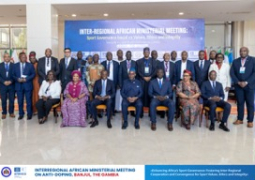The revelations came out during the laying of the report of the standing committee of Finance and Public Accounts Committee (FPAC) covering the 2020 audited accounts of government of The Gambia; the annual - activity reports and audited financial statement of public agencies, hospitals and local government councils read by Hon. Alhagie S. Darboe, Chairperson of the committee.
FPAC noted that the hospital’s Procurement Unit was wrongly placed in charge of keeping the Non-Current Asset (NCA) register. “Items purchased for the hospital were not routed through the stores, as expected, but instead went straight to user departments. Even worse, many items on the asset register had no cost or reference numbers and were not found where the records said they should be,” he stated.
The committee gave the hospital’s management 30 days from the adoption of the report to provide an updated and accurate asset register for further review.
He said that auditors discovered that tally cards and digital records of drugs and food items were outdated or incomplete. Some drugs were already unsealed and being used while still on the shelves without any documentation or proof that they were dispensed by qualified medical staff.
“Worse still, the storage area lacked air conditioning—an essential requirement for preserving certain types of medicine.”
The committee recommended that proper records must be kept for all items moving in and out of the store.
They also recommend that only trained staff should dispense drugs, and only through the correct channels.
“Air conditioners must be installed urgently to protect the potency of medicines.”
In what FPAC described as a “grave concern,” it was also discovered that funds from the Drug Revolving Fund (DRF)—a special fund set aside solely for buying drugs—were instead used to pay hospital staff.
The Committee urged the hospital’s Board and the Ministry of Health to immediately address the situation and stop the misuse of the DRF.
To ensure transparency and sustainability in service delivery, FPAC also recommended a system to reimburse hospitals based on the number of maternal deliveries they perform; submission of all board meeting minutes from 2017 and 2018 to verify decisions on fuel spending; a detailed assessment of the hospital’s monthly repairs and maintenance costs and immediate resolution of all prior-year audit concerns.
Read Other Articles In Headlines

‘Police threatened to electrocute my private part if I don’t admit’
Mar 28, 2024, 11:56 AM

Gambia hosts Inter-Regional African Ministerial Meeting on Anti-Doping
Jan 22, 2025, 10:27 AM



